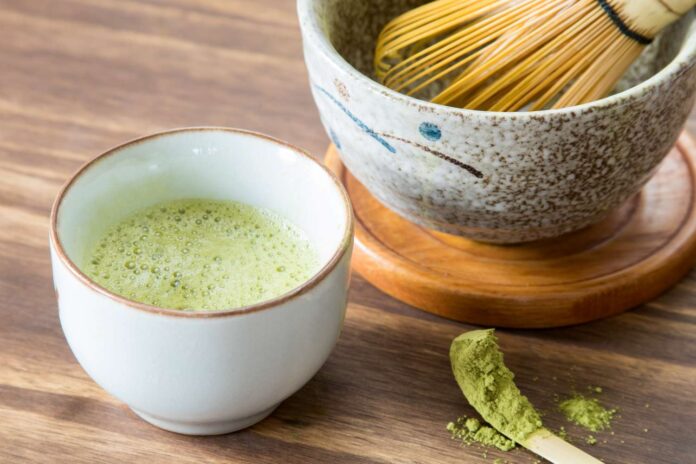Matcha is a type of green tea that is grown and produced in Japan. It is made from the leaves of the tea plant (Camellia sinensis), which are shade-grown for several weeks before harvest. This procedure increases the chlorophyll content of the leaves and provides matcha its vibrant green hue.
After harvest, the tea leaves are carefully processed and ground into a fine powder using traditional stone mills. The resulting matcha powder is then packaged and sold for use in traditional Japanese tea ceremonies and as a culinary ingredient.
To make matcha tea, mix the powder with hot water to produce a frothy, vibrant green beverage. Unlike other types of tea, which are brewed and then discarded, matcha is consumed in its entirety, including the tea leaves. This means that it is richer in nutrients and has a higher concentration of antioxidants compared to other types of tea.
Matcha is known for its distinct, umami-rich flavor and its bright green color. It is often used in traditional Japanese tea ceremonies and is also popular as an ingredient in a variety of dishes and beverages, including lattes, smoothies, and pastries. Someone might choose to buy matcha tea for its nutritional benefits, unique flavor and versatility, cultural and aesthetic appeal, and preparation. It’s important to note that more research is needed to fully understand the potential health benefits of matcha.
Matcha Vs Coffee
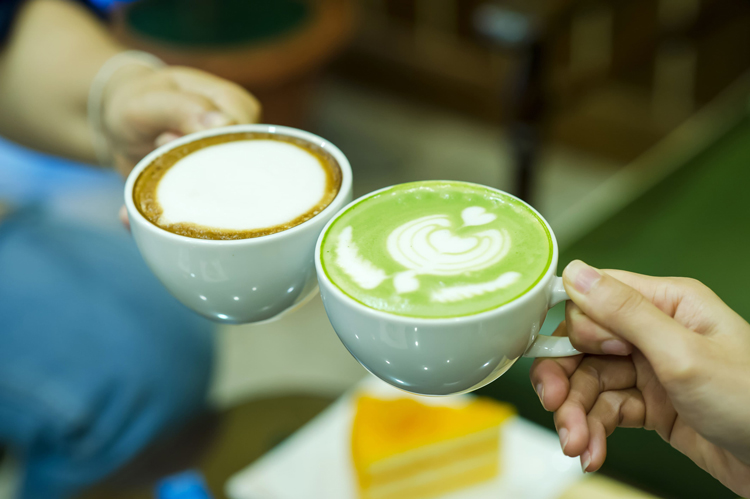
Matcha tea and coffee are both popular beverages that offer different benefits and drawbacks. Here is a comparison of matcha tea and coffee:
Caffeine Content
Both matcha tea and coffee contain caffeine, which is a stimulant that can help improve alertness and focus. However, matcha tea generally contains less caffeine than coffee. A typical serving of matcha tea contains about 35-70 milligrams of caffeine, while a serving of coffee can contain as much as 100-200 milligrams of caffeine.
Overall, matcha tea and coffee are both popular beverages that offer different benefits and drawbacks. It’s important to consider your personal preferences and needs when deciding which one to choose.
Health Benefits Of Matcha
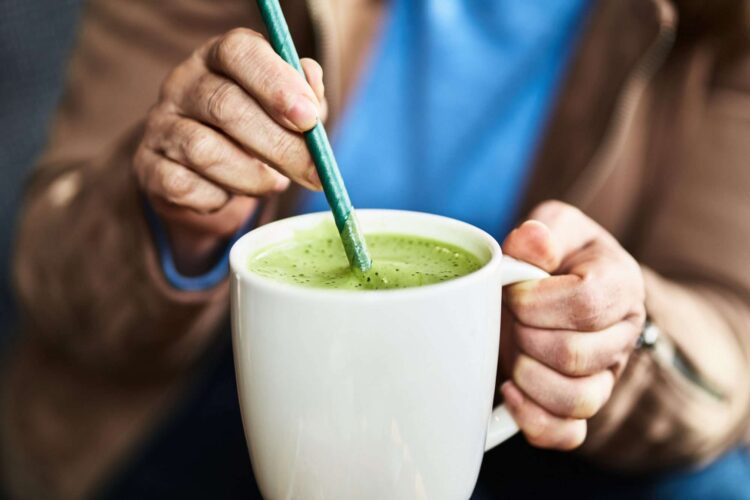
Matcha is a rich source of antioxidants, particularly catechins, which are plant compounds that have been linked to a variety of health benefits. Here are some potential health benefits of matcha:
- May improve brain function: Some research suggests that the catechins found in matcha may have a positive effect on brain function, including improved memory, attention, and reaction time.
- May support weight loss: Some studies have found that the catechins in matcha may help to boost metabolism and support weight loss.
- May reduce the risk of certain diseases: The antioxidants in matcha may help to protect cells from damage caused by free radicals, which can contribute to the development of chronic diseases such as cancer and heart disease.
- May improve heart health: Some research suggests that the catechins in matcha may help to reduce blood pressure and cholesterol levels, which may help to improve heart health.
It’s important to note that more research is needed to fully understand the potential health benefits of matcha. As with any dietary supplement, it’s important to speak with a healthcare provider before adding matcha to your diet.
How Is Matcha Tea Made?
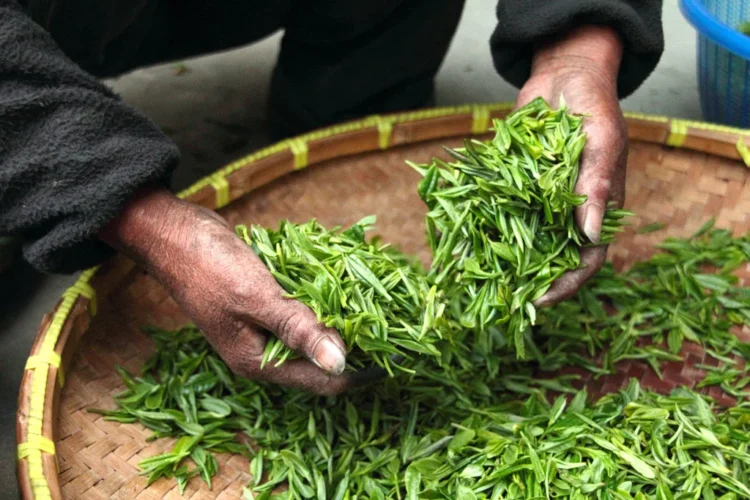
- The leaves of the tea plant are shade-grown for several weeks before harvest. This procedure increases the chlorophyll content of the leaves and provides matcha its vibrant green hue.
- After harvest, the tea leaves are carefully processed and ground into a fine powder using traditional stone mills.
- The resulting matcha powder is then packaged and sold for use in traditional Japanese tea ceremonies and as a culinary ingredient.
To make a cup of matcha tea, place a small amount of the powder (traditionally, about 1 gram) in a bowl or cup. Add hot water (around 175-185 degrees Fahrenheit) and whisk the mixture with a bamboo whisk until it is frothy and well-combined. You can also use a blender or electric frother to create the frothy texture.
Matcha tea is typically served without milk or sweeteners, although some people may prefer to add these ingredients to taste. Matcha tea can also be used as an ingredient in a variety of dishes and beverages, including lattes, smoothies, and pastries.
What Makes Matcha So Special?
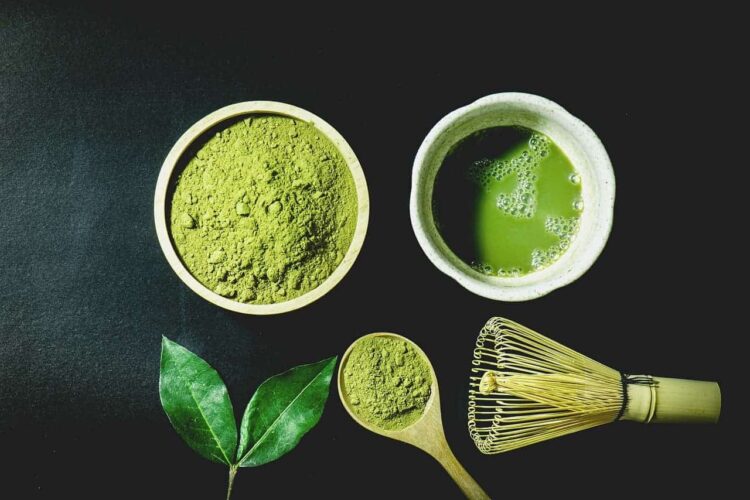
Matcha is a type of green tea that is grown and produced in Japan. It is made by grinding the leaves of the tea plant into a fine powder and is known for its distinct, umami-rich flavor and vibrant green color. There are a few factors that make matcha tea special:
Nutritional profile
Matcha is a rich source of antioxidants, particularly catechins, which are plant compounds that have been linked to a variety of health benefits. Matcha is also a good source of fiber, chlorophyll, and other nutrients.
Flavor and versatility
Matcha has a unique, umami-rich flavor that is often described as “vegetal” or “grassy.” It can be used in a variety of dishes and beverages, including traditional Japanese tea ceremonies, lattes, smoothies, and pastries.
Cultural and aesthetic appeal
Matcha has a long tradition in Japanese culture and is often associated with mindfulness, meditation, and the art of tea. Its bright green color is also visually appealing, which has contributed to its popularity.
Preparation
Matcha tea is made by whisking the powder with hot water to create a frothy, vibrant green drink. Unlike other types of tea, which are brewed and then discarded, matcha is consumed in its entirety, including the tea leaves. This means that it is richer in nutrients and has a higher concentration of antioxidants compared to other types of tea.
The unique flavor, versatility, cultural and aesthetic appeal, and preparation of matcha tea make it a special and a popular beverage.
Conclusion
Matcha is a rich source of antioxidants, particularly catechins, which are plant compounds that have been linked to a variety of health benefits. Some research suggests that the catechins in matcha may help to improve brain function, boost metabolism, reduce the risk of certain diseases, and improve heart health. Additionally, matcha is a good source of fiber, chlorophyll, and other nutrients.
The color green represents health, although matcha does not always need to taste grassy simply because it looks really good for you! The greatest matcha tea is delicious by itself, unlike certain beverages that need sweetener, cream, and citrus to make them acceptable. Traditional matcha goes fantastic whether warm and across ice. This has a delightful vegetative flavor which is balanced by savory umami overtones. Now grab a seat, relax, wind down, & savor a tasty glass of matcha tea.

